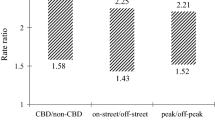Abstract
In urban areas, the number of parking spaces is limited and takes up valuable space that is also needed for other purposes. Demand-driven and systematic utilisation of parking spaces can help to gain the most out of available space. We propose a probability-based approach to control access to off-street parking lots. Our approach takes into account distinct offerings for different customer segments. Registered customers, who pay a monthly fee and have a guarantee of a free parking space at all times, and public customers, who pay according to their parking time. The latter is more profitable and needs to be maximized. We test our approach in a case study with a historic dataset and compare our results with the original control of access. Over two months, we could release on critical periods approximately 22% more parking spaces for public customers.
Access this chapter
Tax calculation will be finalised at checkout
Purchases are for personal use only
Similar content being viewed by others
References
Manville, M., Shoup, D.: Parking, People, and Cities. J. Urban Plann. Dev. 131(4), 233–245 (2005). https://doi.org/10.1061/(ASCE)0733-9488(2005)131:4(233)
van Ommeren, J., Wentink, D., Dekkers, J.: The real price of parking policy. J. Urban Econ. 70, 25–31 (2011). https://doi.org/10.1016/j.jue.2011.02.001
Cai, Y., Chen, J., Zhang, C., Wang, B.: A parking space allocation method to make a shared parking strategy for appertaining parking lots of public buildings. Sustainability 11, 120 (2019). https://doi.org/10.3390/su11010120
MOBIX Homepage. https://mobix.ai/2021/10/07/the-iaa-mobility-2021-mobix-deep-parking-showcase/. Accessed 23 Feb 2022
Buehler, R., Pucher, J., Gerike, R., Götschi, T.: Reducing car dependence in the heart of Europe: lessons from Germany, Austria, and Switzerland. Transp. Rev. 37, 4–25 (2017). https://doi.org/10.1080/01441647.2016.1177799
The Buffalo News Homepage. Buffalo’s zoning code steps into the 21st century. https://buffalonews.com/news/local/buffalos-zoning-code-steps-into-the-21st-century/article_a8b81e45-f6f3-526e-99fe-dde988ef9c78.html. Accessed 23 Feb 2022
Arjona, J., Linares, M.P., Casanovas, J.: A deep learning approach to real-time parking availability prediction for smart cities. In: Hoballah, I. (ed.) Proceedings of the Second International Conference on Data Science, E-Learning and Information Systems - DATA 2019, Dubai, United Arab Emirates, 02.12.2019–05.12.2019, pp. 1–7. ACM Press, New York, New York, USA (2019). https://doi.org/10.1145/3368691.3368707
Badii, C., Nesi, P., Paoli, I.: Predicting available parking slots on critical and regular services by exploiting a range of open data. IEEE Access 6, 1–12 (2018). https://doi.org/10.1109/ACCESS.2018.2864157
Abdeen, M.A.R., Nemer, I.A., Sheltami, T.R.: A balanced algorithm for in-city parking allocation: a case study of Al Madinah City. Sensors. 21, 3148 (2021). https://doi.org/10.3390/s21093148
Tian, Q., Yang, L., Wang, C., Huang, H.-J.: Dynamic pricing for reservation-based parking system: a revenue management method. Transp. Policy 71, 36–44 (2018). https://doi.org/10.1016/j.tranpol.2018.07.007
Caicedo, F., Blazquez, C., Miranda, P.: Prediction of parking space availability in real time. Expert Syst. Appl. 39, 1–9 (2012). https://doi.org/10.1016/j.eswa.2012.01.091
Stolfi, D.H., Alba, E., Yao, X.: Can I park in the city center? Predicting car park occupancy rates in smart cities. J. Urban Technol. 27, 27–41 (2019). https://doi.org/10.1080/10630732.2019.1586223
Vlahogianni, E.I., Kepaptsoglou, K., Tsetsos, V., Karlaftis, M.G.: A real-time parking prediction system for smart cities. J. Intell. Transp. Syst. 30, 192–204 (2016). https://doi.org/10.1080/15472450.2015.1037955
Geng, Y., Cassandras, C.G.: New “smart parking” system based on resource allocation and reservations. IEEE Trans. Intell. Transport. Syst. 30, 192–204 (2013). https://doi.org/10.1109/TITS.2013.2252428
Wu, E.H.-K., Sahoo, J., Liu, C.-Y., Jin, M.-H., Lin, S.-H.: Agile urban parking recommendation service for intelligent vehicular guiding system. IEEE Intell. Transport. 6, 35–49 (2014). https://doi.org/10.1109/MITS.2013.2268549
Saharan, S., Kumar, N., Bawa, S.: An efficient smart parking pricing system for smart city environment: A machine-learning based approach. Future Gener. Comput. Syst. 106, 222–240 (2020). https://doi.org/10.1016/j.future.2020.01.031
Guadix, J., Onieva, L., Muñuzuri, J., Cortés, P.: An overview of revenue management in service industries: an application to car parks. Serv. Indust. J. 31, 91–105 (2011). https://doi.org/10.1080/02642069.2010.491543
Author information
Authors and Affiliations
Corresponding author
Editor information
Editors and Affiliations
Rights and permissions
Copyright information
© 2022 The Author(s), under exclusive license to Springer Nature Switzerland AG
About this paper
Cite this paper
Müller, T., Piller, G., Rothlauf, F. (2022). Efficient Access Control to Parking Space for Different Customer Segments. In: Ivanovic, M., Kirikova, M., Niedrite, L. (eds) Digital Business and Intelligent Systems. Baltic DB&IS 2022. Communications in Computer and Information Science, vol 1598. Springer, Cham. https://doi.org/10.1007/978-3-031-09850-5_2
Download citation
DOI: https://doi.org/10.1007/978-3-031-09850-5_2
Published:
Publisher Name: Springer, Cham
Print ISBN: 978-3-031-09849-9
Online ISBN: 978-3-031-09850-5
eBook Packages: Computer ScienceComputer Science (R0)




